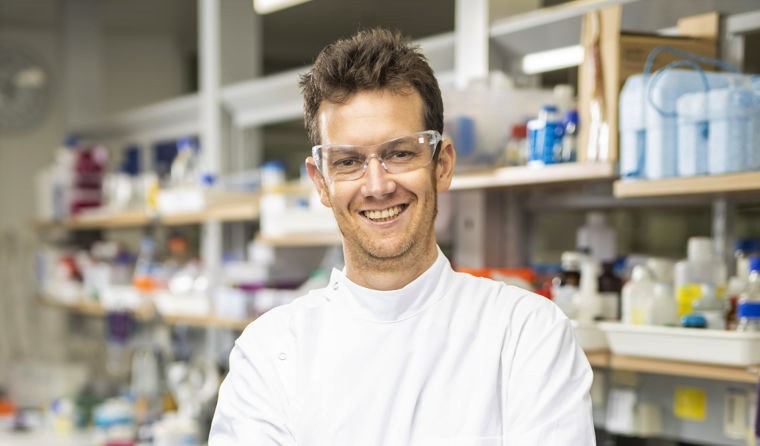News
Could Australia have the answer to a COVID vaccine?
Pre-clinical trial data presented by the University of Queensland shows its vaccine candidate is safe and induces a strong T-cell response.
 Pre-clinical testing data for the University of Queensland’s ‘molecular clamp technology’ vaccine indicates it is safe and produces an immune response against COVID-19. (Image: Glenn Hunt)
Pre-clinical testing data for the University of Queensland’s ‘molecular clamp technology’ vaccine indicates it is safe and produces an immune response against COVID-19. (Image: Glenn Hunt)
The Australian Government announced last week that it had signed a letter of intent for 24 million doses of AZD1222, Oxford University and AstraZeneca’s vaccine candidate. But efforts closer to home are showing great promise.
Pre-clinical testing data for the University of Queensland’s (UQ) ‘molecular clamp technology’ vaccine indicates it is safe and produces an immune response against COVID-19.
The findings from animal model tests, yet to be published in a peer-review journal, were presented to the International Society for Vaccines Congress by project co-leader Associate Professor Keith Chappell on 26 August.
‘All the results show that it’s safe and likely to provide protection against both the viral infection and the symptoms of disease,’ Associate Professor Keith Chappell said.
‘The neutralising immune response created by our molecular clamp vaccine in animal models was better than the average level of antibodies found in patients who have recovered from COVID-19.’
In the hamster model, the animals were given the vaccine, combined with the Seqirus MF59 adjuvant, and then exposed to the virus. Results showed that it provided protection against virus replication, reduced lung inflammation, and induced a strong T-cell response.
‘The protection we saw after a single dose was better than we expected,’ Associate Professor Chappell said.
‘[It] looks like two doses do a great job of protecting both against virus replication and the disease.’
The vaccine commenced phase 1 human trials with 120 volunteers on 13 July, with data expected to be available before the end of the year. Associate Professor Chappell says there have so far been ‘absolutely no safety concerns’.
The data presented overnight also showed strong results relating to manufacturability.
UQ and the Coalition for Epidemic Preparedness (CEPI) announced a partnership with Australian biotech company CSL in June to rapidly advance clinical development and manufacture if clinical trials prove successful.
‘One of the big challenges in the development of vaccines is the ability to produce them at sufficient scale for widespread use,’ Associate Professor Chappell said.
‘We are working with CSL to ensure the production yield is as efficient as possible, and have every confidence they will be able to manufacture the millions of doses required to protect the Australian public.’

As countries race to develop a vaccine, Associate Professor Chappell encouraged the scientific community to work together to race ‘against the virus and not against other projects’. (Image: Glenn Hunt)
Elsewhere in Australia, Flinders University’s vaccine candidate COVAX-19, developed by biotechnology firm Vaxine, was given the green light by the Central Adelaide Local Health Network Human Research Ethics Committee to commence phase 2 trials last month.
Vaxine’s business manager told newsGP data from phase 1 human trials is anticipated to be published in four weeks.
‘The subjects have had the vaccine, they’ve had no problems at all, and so that now allows us to move forward into much bigger studies to confirm the effectiveness of the vaccine,’ project lead Professor Nikolai Petrovsky previously told newsGP.
The Flinders University team is yet to secure any funding, but newsGP was told the plan is to push forward and accelerate their efforts by combining phase 2 and 3 trials.
But Oxford University’s efforts remain ahead of the curve.
Already undergoing phase 3 testing, Director of the Oxford Vaccine Group Professor Andrew Pollard said if scientists are able to gather enough data it could be put before regulators as early as this year.
‘It is just possible that if the cases accrue rapidly in the clinical trials, that we could have that data before regulators this year, and then there would be a process that they go through in order to make a full assessment of the data,’ he told BBC Radio on 25 August.
In the US, where more than 180,000 COVID deaths have been recorded, reports have emerged that the Trump administration is considering fast-tracking the Oxford vaccine for use ahead of the 3 November presidential elections.
One option being explored, according to The Financial Times, would see the US Food and Drug Administration (FDA) awarding ‘emergency use authorisation’ in October.
Professor Pollard said the process of emergency-use authorisation in an emergency is ‘well-established’, but emphasised that it would still involve having ‘carefully conducted data ... and evidence that it actually works’.
To improve vaccine access for Pacific and Southeast Asian countries, the Australian Government has announced it will contribute $80 million to support the Gavi COVAX Facility Advance Market Commitment (COVAX AMC).
The COVAX AMC will address the acute phase of the pandemic, providing doses for up to 20% of countries’ populations in its first phase, ensuring healthcare workers and vulnerable groups, such as the elderly, have access.
As the pressure mounts to find a successful vaccine and countries look to rebuild their economies, Associate Professor Chappell encouraged the scientific community to work together to race ‘against the virus and not against other projects’.
‘At the moment it is not possible to compare the immune response between vaccines as different teams are using different assays and methods to test virus neutralisation,’ he said.
‘We hope that by sharing data and comparing it to an international reference standard we will inspire other teams to do the same.’
Log in below to join the conversation.
coronavirus COVID-19 Queensland vaccine
newsGP weekly poll
What is your chief concern with role substitution?